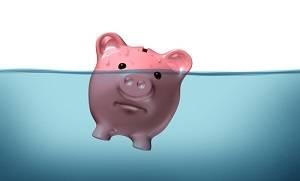Divorce and Filing for Bankruptcy
 Sometimes, life attacks from multiple sides. Sadly, it is not uncommon for those going through a divorce to end up in bankruptcy at the same time, with seismic changes to one’s finances as a result of debt restructuring. However, depending on your unique situation, it can be difficult to determine which proceeding should happen first and how to handle both.
Sometimes, life attacks from multiple sides. Sadly, it is not uncommon for those going through a divorce to end up in bankruptcy at the same time, with seismic changes to one’s finances as a result of debt restructuring. However, depending on your unique situation, it can be difficult to determine which proceeding should happen first and how to handle both.
Divorce First
Depending on the situation, getting a divorce before filing for bankruptcy can be the best path for many couples. There are two different types of bankruptcy filings, each named for the chapter of the U.S. Bankruptcy Code used for the filing. Chapter 7 is for individuals or couples with very few assets, while Chapter 13, also called a reorganization bankruptcy, is for those with steady income and debt that it is possible to restructure.
It is possible for couples to file together, but it is also common for each person to file individually. If you are divorced before your bankruptcy proceedings, a Chapter 7 filing will be much more streamlined than it might be otherwise. Conversely, if the divorce happens after the bankruptcy, marital assets might be sold to pay off debts during the filing, which can make a later divorce extremely difficult in terms of equitable distribution of the remaining assets. Whether you file together as a couple or as individuals can also make a difference. Some debts are not dischargeable, and with many marital debts, it is possible for creditors to attempt to hold the husband responsible for debts that the wife originated and vice versa.
Bankruptcy First
Many attorneys do advocate that if you must experience bankruptcy and divorce so close together, it is best to declare bankruptcy first. In many situations, especially if a couple qualifies under the means test, either a Chapter 7 or Chapter 13 filing (especially if filed jointly) can confer significant advantages. For example, a joint Chapter 7 filing can eliminate much unsecured debt, which can streamline your divorce. A Chapter 13 filing, even if done before divorce proceedings begin, can act as a kind of stopgap between you and your creditors. This is because a Chapter 13 filing is a reorganization, and it typically comes with a budget and a repayment plan. Therefore, even if you are not divorced, you may still have enough money to live apart or at least spend time apart.
There are, however, instances where filing bankruptcy first can be problematic. Filing for Chapter 7 bankruptcy and then filing for divorce before the proceeding ends essentially creates a logjam in court - the bankruptcy proceeding freezes the person’s (or couple’s) assets, and a family court judge does not have the authority to divide marital property if assets are frozen. It is generally up to the parties involved to determine which is best for their situation.
Seek Experienced Legal Assistance
Both divorce law and bankruptcy law can be very confusing, but we can help. Contact one of our experienced Kane County divorce attorneys to get the guidance you need. Call 630-232-9700 for a confidential consultation at The Law Offices of Douglas B. Warlick & Associates today.
Sources:
http://www.uscourts.gov/services-forms/bankruptcy/bankruptcy-basics/chapter-7-bankruptcy-basics
https://www.justice.gov/ust/means-testing






